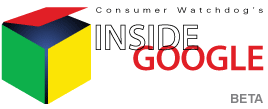Microsoft caught hell from anti-trust regulators for bundling its browser and software during the 1990s. A new report being distributed to US and European antitrust regulators today shows how Google has been using its greater than 70% share of the online search market to muscle its way into domination of other Internet businesses.
The Inside Google study found that since adopting "Universal Search" in 2007, which favors Google's properties with prominent listings in its results, traffic to Google's sites has soared at the expense of competitors. In a nut shell, Google search results give preference to Google products and services, like Googlemaps, YouTube, and Google product search, where advertisers pay to find you and make Google rich.
Google claims that its search is neutral, but the study shows that it's not. Competitors pay a big price for not being part of the Google brand. This a key reason, along with Google's threat to our privacy rights, that I helped launch InsideGoogle.com. At the new site, we are trying to open up Google's black box and shame it into better practices. Already Google has adopted my consumer group's call for SSL encryption in Search and gmail.
"Traffic Report: How Google is Squeezing out Competitors and Muscling Into New Markets," is a study of Internet traffic data for more than 100 popular websites since 2007 revealed Google's dramatic gains. Inside Google obtained three years of Internet traffic data from the respected web metrics firm Experian Hitwise.
The data shows that Google has established a Microsoft-like monopoly in some key areas of the web. In video, Google has nearly doubled its market share to almost 80%. That is the legal definition of a monopoly, according to the federal courts, which have held that a firm achieves "monopoly power" when it gains between 70% and 80% of a market, the report noted.
The Inside Google analysis found that the most striking example of the power of the Universal Search strategy is MapQuest, a unit of AOL whose market share has dwindled to 32%, down from 57.24% in July 2007. The Hitwise data shows that the stark decline in visits to MapQuest was accompanied by a closely matching rise in visits to Google Maps, as Google put its own service atop all others for generic address searches.
"MapQuest, a unit of AOL, appears likely to soon be reduced from a dominant player in web commerce to an also-ran, due in large part to the steps taken by Google to favor its own locator service," the report said. "Google is now the now the dominant provider of local search information with more than 51% of the market."
Google claims that with the introduction of Universal Search, the company was attempting to break down the walls that traditionally separated its various search properties and give " the very best answer, even if you don't know where to look."
The Inside Google study reaches a different conclusion: "The reality is a bit more crass: Universal Search now populates the top of the results page mainly with results from Google's own product lines. These changes bring the search giant several steps closer to a closed ecosystem where real consumer choice no longer exists."
The report was written by Glenn Simpson, formerly an investigative reporter with the Wall Street Journal.
